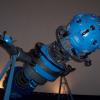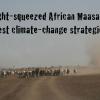Clint Talbott
 He was the kind of student over whom universities normally compete. But two significant obstacles stood between him and a course of study at CU-Boulder. One was money, as his family was of modest means. The other was citizenship.
He was the kind of student over whom universities normally compete. But two significant obstacles stood between him and a course of study at CU-Boulder. One was money, as his family was of modest means. The other was citizenship. For years, a CU-Boulder anthropologist has been training Vietnamese scientists to help preserve endangered primates in Vietnam. His work is gratifying has a more “profound” effect than other work he could do, he says.
For years, a CU-Boulder anthropologist has been training Vietnamese scientists to help preserve endangered primates in Vietnam. His work is gratifying has a more “profound” effect than other work he could do, he says. "I was called many things that I cannot repeat here, but the most professional accusation I received was that I was breaking the laws of thermodynamics. I took that pretty hard,” says College Professor of Distinction
"I was called many things that I cannot repeat here, but the most professional accusation I received was that I was breaking the laws of thermodynamics. I took that pretty hard,” says College Professor of Distinction U.S. geologists have noted greater frequency of earthquakes in the last four years, in some cases where wastewater is injected deep underground after hydrologic fracturing, but a prominent geologist at CU-Boulder at CU-Boulder says scientists don’t yet know enough to predict when wastewater injected underground after “fracking” might cause major earthquakes.
U.S. geologists have noted greater frequency of earthquakes in the last four years, in some cases where wastewater is injected deep underground after hydrologic fracturing, but a prominent geologist at CU-Boulder at CU-Boulder says scientists don’t yet know enough to predict when wastewater injected underground after “fracking” might cause major earthquakes. In his University of Colorado Boulder office, David Shneer gestured to material on his table. A rare book there documents the sketches of the building of Auschwitz. Only five copies exist, and the Mazal Holocaust Collection, recently donated to the university, has two.
In his University of Colorado Boulder office, David Shneer gestured to material on his table. A rare book there documents the sketches of the building of Auschwitz. Only five copies exist, and the Mazal Holocaust Collection, recently donated to the university, has two. Since 1975, Fiske Planetarium has been the Johnny Appleseed of astronomy. Each year, 30,000 K-12 students and 4,000 University of Colorado Boulder students go there to take a front-row seat on the universe.
Since 1975, Fiske Planetarium has been the Johnny Appleseed of astronomy. Each year, 30,000 K-12 students and 4,000 University of Colorado Boulder students go there to take a front-row seat on the universe. Jessica Lutz was named the Outstanding Graduate of the College of Arts and Sciences for the spring 2013 commencement.Author of two honors theses, in linguistics and microbiology, hopes well-rounded education will prepare her for life-saving workSome
Jessica Lutz was named the Outstanding Graduate of the College of Arts and Sciences for the spring 2013 commencement.Author of two honors theses, in linguistics and microbiology, hopes well-rounded education will prepare her for life-saving workSome East Africa’s Maasai on the hunt for lions. Some conservation initiatives designed to save lions from being hunted have either failed to work or in some cases appear to have incited Maasai to hunt more lions as a form of political protest, the
East Africa’s Maasai on the hunt for lions. Some conservation initiatives designed to save lions from being hunted have either failed to work or in some cases appear to have incited Maasai to hunt more lions as a form of political protest, the The devastating drought of 2009 in northern Tanzania generated new coping strategies by Maasai people, suggesting that Maasai with more money and social connections are better able than their poorer, less-connected neighbors to endure extreme events such as drought and, potentially, climate change, a team of University of Colorado Boulder researchers has found.
The devastating drought of 2009 in northern Tanzania generated new coping strategies by Maasai people, suggesting that Maasai with more money and social connections are better able than their poorer, less-connected neighbors to endure extreme events such as drought and, potentially, climate change, a team of University of Colorado Boulder researchers has found. Wei Zhang, an assistant professor in the Department of Chemistry and Biochemistry at the University of Colorado Boulder, has won a prestigious Sloan Research Fellowship.Awarded annually since 1955, the fellowships are given to early career
Wei Zhang, an assistant professor in the Department of Chemistry and Biochemistry at the University of Colorado Boulder, has won a prestigious Sloan Research Fellowship.Awarded annually since 1955, the fellowships are given to early career

